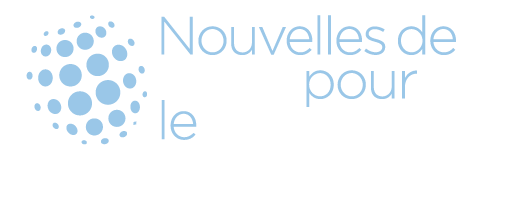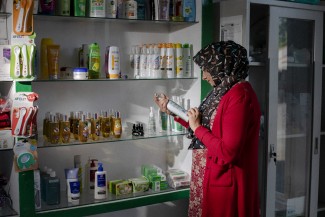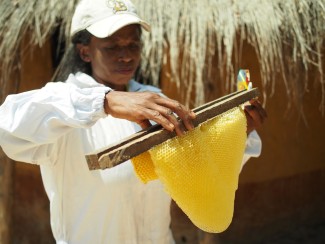Island nation focusing on its unique, specialty plant life to kick start economic growth
Among the botanical medley of banana, mango, cassava and peanut plants on this lush parcel on the northern coast of Anjouan is also the ylang-ylang – a slender tree that blossoms with delicate yellow flowers. One sunny morning, like so many mornings before, these golden, tapered blooms are being swiftly plucked and tucked away by Djamilia Alaoui.
Part of a newly established ylang-ylang cooperative in Comoros, Djamilia is one of approximately 250 female ylang-ylang pickers, 50 planters and 47 male distillers that are now co-op contributors.
The three islands that make up Comoros are flush with ylang-ylang plantings and dotted with nearby home-owned distilleries: for the flowers must be transformed into oil quickly following harvest. With the cooperative, Djamilia’s efforts are now directly connected to that of the distillers, and a new set of equipment sits at the edge of the ylang-ylang fields where she makes quick work of any flowers emanating a sweet scent.
“We harvest the flowers in our fields. We distill the oils in our distillery. And we export right at the Port of Mutsamudu,” said President of the Association of Comoros Ylang-ylang, Vanilla and Clove Cooperatives — Abdou Ahamadi — of the new setup.
He added, “every month, the coop produces 400 liters of oil. All the oils we produce go to France.”
HER STORY
While seemingly marginal considering flight schedules and proximity to market centers, Comoros is strategically-situated along an oceanic trade route that has been connecting Asia to Africa to Europe for centuries.
Those historic connections are everywhere apparent in what is cultivated for export, namely cloves, ylang-ylang and vanilla, luxury items originating from distant colonies that have struck the fancy of people past, present and — as the Government of Comoros hopes — into the future.
The tiny, volcanic islands produce 60 percent of the world’s supply of ylang-ylang, and the Government — with support from the Enhanced Integrated Framework (EIF) — is aiming for a larger share of the market. To improve yields, to boost production and to make a bigger mark in the ylang-ylang business, the partnership is supporting the creation of cooperatives, providing distillation equipment, training farmers in improved planting techniques and buoying a select group of female entrepreneurs, all of whom are producing locally-made Comorian products.
Houria Said Muhammed is one of them. She started her company NectaLab out of her home with the idea to create beauty products born out of the essences of Comoros.
“I receive the ylang-ylang essential oil from the distillery. I then go on to dry and filter the essential oil to make sure it’s clear and pure… We are very proud because it’s a local product that is in demand all over the world. I have five employees in my small lab. Each month, we produce about 200 products,” she said.
Through EIF’s partnership with the United Nations Development Programme (UNDP) and the International Trade Centre (ITC), Houria received equipment so she could increase her production and advice on branding and bottling.
Ibrahima Sittina Farate is another young, female innovator in Comoros who obtained support. With three hectares of ylang-ylang, a distillery amid her fields and an agronomy degree, she wants to do more with Comoros’ specialty harvests, and is ready to expand into even more artisanal, eco-friendly skincare items.
“I want to do things differently. Just because we’ve been doing something for hundreds of years doesn’t mean we should continue to,” she said while demonstrating steam ylang-ylang distillation and explaining the varieties of oil quality. “Why can’t we change?”
CURRENTS OF COMMERCE
Through middlemen, some of Houria and Sittina’s products make it to France, but they are limited by market opportunities, geographic isolation and lack of financing.
But there is great potential here. Vanilla, ylang-ylang and clove account for 80 percent of the country’s exports, employing 45 percent of the workforce. Yet the country is ranked 160 out of 188 on the UN’s 2016 Human Development Index (HDI). It is clear more work is needed to enhance the sector, to create jobs for a large youthful population and to reduce poverty.
Speaking in his Moroni offices, Vice President in Charge of Economy, Energy, Industry, Handicraft, Tourism, Investment, Private Sector and Land Affairs — Djaffar Ahmed Said Hassani — said, “Today we have more yields thanks to the EIF. We’ve also acquired equipment and we’ve also trained our farmers. And, all of that has allowed us to improve the production of our cash crops.”
“Yes, we need aid and support and assistance. So, I’m asking for other partners to align with the EIF to help us grow our cash crops. And in return, as the government of Comoros, we’ll also work hard to ensure that our three cash crops will make their mark on the world.”
In fact, over the centuries these Comorian crops already have, with ylang-ylang a key ingredient in perfumes including the celebrated Chanel No. 5, vanilla the world’s second most expensive spice, and the competition over cloves igniting 17th century trade wars.
Sittina’s 500 ylang-ylang trees produce 10 tonnes of flowers every year, yielding 100 kilograms of oil that can go for more than USD$100/kilo, so the crop does contribute cash — but for Comoros it has the potential to make much more of a mark.
CASHING IN
UNDP Comoros Deputy Resident Representative Emma Ngouan-anoh said, “the EIF trainings are very useful for our cooperatives to improve the distillation of the ylang-ylang, improve the quality of the vanilla and improve the quality of our cloves.”
It is these enhancements via cooperatives and in quality, combined with creative products and expanded markets, that will be the key for the people of Comoros to improve their situations.
For Djamilia, her fisherman husband, and their seven children, the new co-op she is part of could mean steadier income with ylang-ylang now more easily moving from her boughs to fragranced wrists the world over.
With the improvements in her processing capabilities, Houria of NectaLab is thinking big. “My dream is to no longer have a small laboratory at my home. But instead to create an enterprise and employ a lot of people.”
If you would like to reuse any material published here, please let us know by sending an email to EIF Communications: eifcommunications@wto.org.


